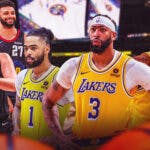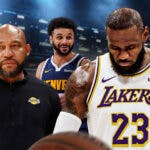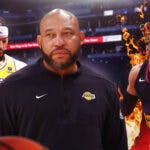As the Los Angeles Lakers wind down their incredibly disappointing 2018-2019 season, all the focus is on the future of the team, and in particular, the future of LeBron James.
The superstar forward had a typically excellent season from a statistical standpoint, but there were (too many) times when his effort was lacking. He has played in just 50 games, by far the fewest of his career. James obviously isn't finished, but he will turn 35 in December. He may be the greatest talent the game of basketball has ever seen, but even he is not immortal. Having won three championships during his 16 years in the league, James is no longer prioritizing winning. If he was, he would not have signed with the Lakers. His decision to play for Los Angeles was an off-court one, although there is still one thing that James has yet to accomplish: playing with his son. Here's what needs to happen for LeBron and LeBron Jr. to become the next Ken Griffey and Ken Griffey Jr.
If the NBA follows through on permitting high school graduates to enter the Draft, Bronny will be eligible in 2023. That's assuming he decides to not attend college. James has made a massive impact in the Akron community by helping children attend school and college, and as James is a huge proponent of education, perhaps he will recommend that his son attend university, at least for one year. If that is the case, James Jr. would be in high demand from the top basketball colleges, and would be eligible for the draft beginning in 2024.
Bronny will turn 15 in October and is currently 5-11. It's unlikely that he will turn out to be the devastating athlete his father is, but he has made up for that by developing his ball-handling and shooting skills to the point where Dad (LeBron) admits his son is further along than he was at the same age. Bronny may not be the top prospect in his class or “The Chosen One” at 17 years old, but he should still be an excellent player and a future NBA draft pick.
If Bronny decides to forgo college and enter the draft upon graduation of high school, his father will turn 39 shortly after the season begins. James is still a top-three player at 34, but it's unfair to expect him to play at that level deep into his 30s, when most players have already retired. James' skills may remain, but his athleticism and durability will inevitably leave him. He has made significant strides in the technical area of his game, adding post moves and improving his 3-point shooting, but as he continues to age, James will need to evolve even more, to the point where instead of being the primary ball-handler and attempting 20 shots per game, he becomes a 3-and-D role player. He must specialize in catch-and-shoot opportunities. This will prolong his career, but more importantly, it will make him desirable to the team that drafts his son.
While the team that spends a draft pick on James Jr. will do so to add the younger James, that team won't be able to escape the thought that drafting Bronny would mean his father may sign to join him. Nothing would be guaranteed, but if LeBron James is a free agent and wants to play with his son, he certainly has the influence to make it happen. If he is still running the offense at age 38 and his effectiveness has dropped because of it, Bronny's new team would be less likely to entertain the idea of paying the elder James. But if LeBron James has molded his game to be a better complementary bench piece (the mere thought is hard to entertain), it becomes much more realistic.
If this father-son team-up does happen, it probably won't be for long. If James isn't concerned with winning championships when he is still in his prime, it's unlikely he will rediscover that urge at the end of his career. Depending on how high Bronny is drafted, his team may not be in a position to contend. For LeBron, playing with his son would be a family-based endeavor, not a legacy-based one. Given the kind of family man LeBron James is, there's absolutely nothing wrong with that.




